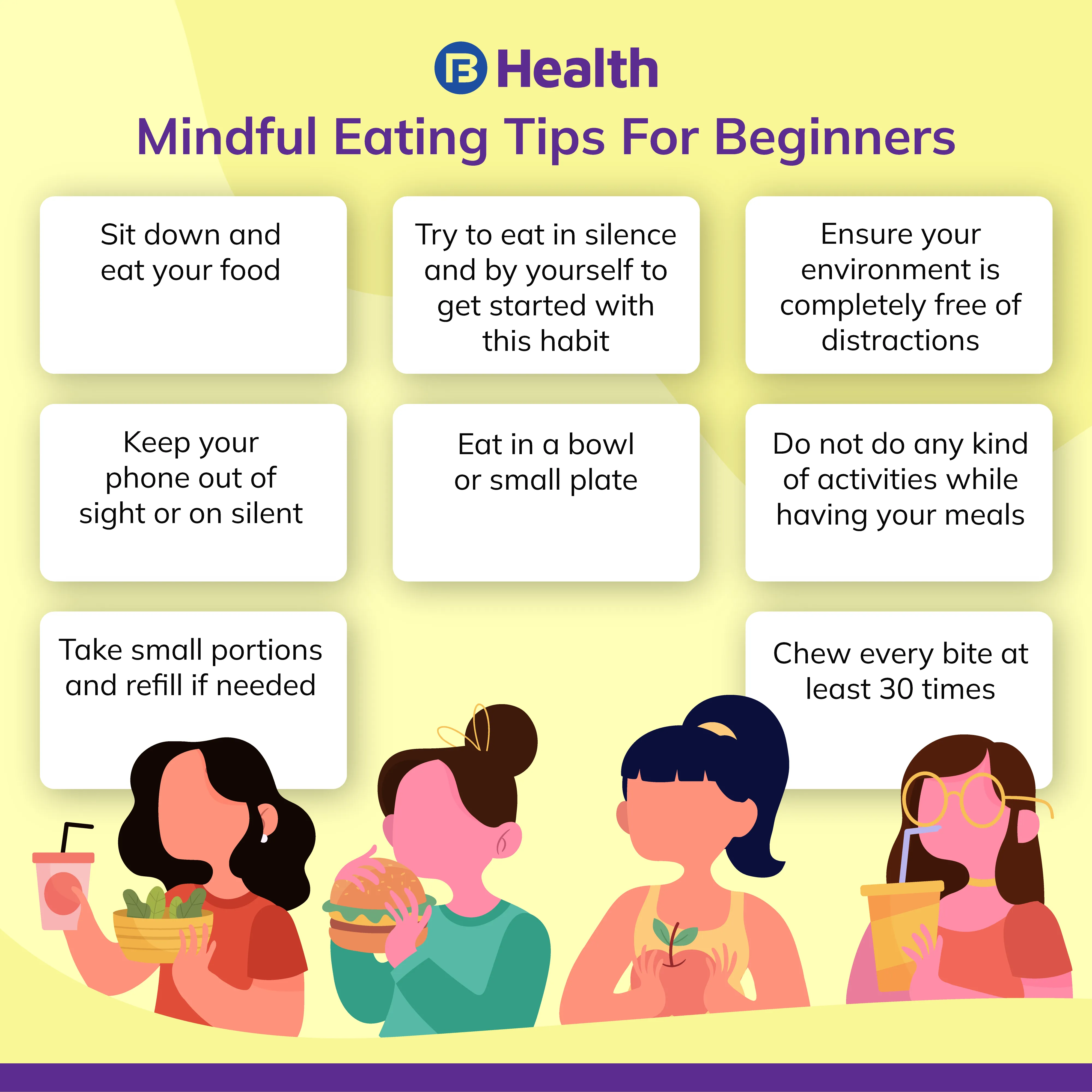Mental Wellness | 12 min read
What is Health-Conscious Eating? Five Benefits of Mindful Eating!
Medically reviewed by
Table of Content
Key Takeaways
- Mindful eating techniques increase your awareness about what you eat
- Benefits of conscious eating include improved digestion and reduced stress
- Use these mindful eating tips in your daily routine for a healthy lifestyle
With time, new healthy practices come to the fore, and one that has become a lot more popular is mindful eating. In fact, the 5-day mindful eating challenge has become common among people. But what is mindful eating, and how is it beneficial? Simply put, health-conscious eating or mindful eating refers to a unique approach to eating food. Here, you are meant to be fully attentive to the experience of eating and completely aware of the foods you ingest. This is intended to help you better enjoy the food you eat by helping you slow down the process. [1]. These mindful eating techniques can help improve symptoms of
- Depression
- Eating disorders
- Anxiety
- Obesity
- Stress
Mindful eating benefits you by promoting healthy eating habits, preventing overeating, and improving your mental health. It can also fix a few habits that you may have picked up over the years, which include watching TV or scrolling through social media while eating. These distractions lower satisfaction with your meals and decrease your awareness of the things you consume. For a deep dive into this unique approach and to know its benefits, read on.

What is involved in mindful or conscious eating?
Mindful eating helps you make conscious decisions about what you include in your meals. The trick is to slow down and pay attention to your food during mealtime. It is focusing on your food and listening to what your stomach and brain are telling you. One of the components of mindful eating is meditation, which is key to this approach. It helps you improve mental health conditions like depression and anxiety [2].
Another component is to engage all your senses of touch, smell, and sight. This helps you notice how the food looks and smells so you can appreciate flavor and texture too! As you become more attentive to your food, your connection with it improves. In fact, mindful eating can help you pay more attention to the nutrients in your meal and how they benefit the body.
Why is mindful eating is helpful?
People have a wide variety of food options in today's fast-paced culture. In addition, distractions such as television, computers, and cell phones have taken people's focus away from the actual act of eating.
As eating becomes a mindless, frequently hurried activity, it takes some time for your brain to realize that you are full. This could be an issue. If you eat too quickly, the fullness signal can only appear once you've consumed too much food. This frequently occurs with binge eating disorder. (BED).
Eating becomes a purposeful, slow-paced activity instead of an instinctual one when you eat thoughtfully. Additionally, you can differentiate between emotional and actual physical hunger by improving your ability to recognize physical hunger and fullness cues. You also become more conscious of the factors that make you crave food even when you're not really hungry. Finally, by putting some distance between your triggers and your response, you can give yourself the time and discretion to decide how to respond.
What is the mindful eating challenge?
Think of a mindful eating challenge like a mindful eating exercise that helps you gain control over reckless eating habits and reduce emotional snacking. It helps you learn your fullness and hunger cues. It usually involves reducing any distractions during meals, learning to check in with yourself emotionally before, during, and after a meal, slowing down while eating by chewing more or taking short breaks, meditating, and measuring your hunger and fullness on your own before and after a meal.
Additional Read: 6 Crucial Nutrition Concepts That Form a Key Part of a Healthy DietHow Can You Practice Mindful Eating?
Exercise Mindfulness when Eating
While consuming a certain food, a person can practice being mindful. They practice savoring the food while tuning out all other distractions and paying attention to its sensory implications and aspects.
Additionally, it's crucial to adopt a non-judgmental attitude towards your food choices; in other words, food is neither "good" nor "bad." You might feel better over time if you notice how that food makes you feel. For example, you can think does the food provide me with energy, or does it make me extremely tempted to eat more? However, you aren't rating the dish as good or poor.
Alter your perspective on food
Another important factor is adopting a positive outlook on food. One is far more likely to fail if they have a bad mood or feels deprived. Therefore, one can practice turning the negative phrase "I can't have something to eat" into the positive one, "I choose not to eat it."
Plan smaller meals
Due to your hectic work and family schedules, you could discover that you only eat one or two large meals each day rather than distributing your meals throughout the whole day. As a result, your stomach can swell (bloat), at which point you'll need more food to feel satisfied. So plan smaller meals three hours apart to break this behaviour. These could consist of a tiny mini-meal like yoghurt, fruit, and a handful of nuts.
Find the right people to help you stay accountable
As you embark on a mindful eating journey, joining live or online support groups can be an excellent method to help keep you accountable. Nobody is more qualified to understand your struggles than those in your shoes. Others may have encountered and employed advantageous tactics and may now be able to impart that information to you.

How to practice conscious eating?
Mindful eating is a process that may take you some time to master. So, do not get frustrated if you find it a little challenging in the beginning! When you are used to a fast pace while having your meals, slowing down can be a bit of a task. If you make face trouble slowing down, try some deep breathing before starting your meal. Experts also suggest meditation for 2-5 minutes before you start eating.
Here are a few mindful eating techniques that you can try:
- Shop smartly as the process of mindful eating starts before the meal itself. Try not to shop when you are hungry and stay on the side of the store where fresh food is kept.
- Remove unnecessary processed foods from your kitchen.
- Slow down. It will help you fill your stomach by eating less.
- Take down notes as you enjoy your meal like you are at a wine tasting. This forces you to notice things like textures and flavors that you would otherwise miss.
- Savor your food and take the time to enjoy each bite. Doing so will bring out the flavor in your plate.
- Tune out the world when you sit down for a meal. Eating in silence is a great way to do so, especially by avoiding reading or watching television.
What are the benefits of mindful eating?
There are many benefits of conscious eating, which include:
Weight loss
With mindful eating, weight loss is one of the benefits that you can enjoy. This is primarily because it curbs mindless eating, which occurs when you aren’t paying attention to your food. This then reduces instances of overeating and doing so definitely helps weight loss efforts. Besides shedding a few kilos, mindful eating is also a great way to regulate your body weight [3].
Reduces stress
Cortisol spikes when you’re stressed and is linked with the stress you experience. If you are overly stressed, your cortisol level increases. One way to address this problem is to incorporate mindful eating into your routine. Owing to the fact that you are often recommended to meditate and take things slow, these practices can help minimize stress [4].

Improves digestion
Unchecked stress can lead to many problems, and a common manifestation is digestive distress. For instance, IBS or irritable bowel syndrome is greatly impacted by how stressed you are during the day. Thankfully, among the benefits of mindful eating is that it helps with stress and, in doing so, also helps with such issues. Additionally, mindful eating requires you to slow down the pace at which you consume your food, and this is known to help with digestion, too [5].
Helps choose better food options
Mindful eating techniques require you to understand the foods you consume, and to do so; you will have to know the nutrient content. In fact, it pushes you to learn about the different foods and how they impact the body. For instance, certain foods leave you feeling energized, and through mindful eating, you can develop a better relationship with food. Over time, it helps naturally reduce overeating and its associated issues, such as low energy and bloating.
Better awareness of your hunger and satiety
Mindful eating helps you rid your environment of distractions while you eat. This simple change has several profound benefits, which include a better understanding of your hunger cues. Moreover, it enables you to pay more attention to your satiety, effectively minimizing the chances of overeating. Remember, the body will take time to let you know that it is full, and eating too quickly can cause you to eat in excess very easily. Instead, slow down and learn to spot when you’re full and don’t need more food.
Some common cues of being full include a lack of hunger and interest in the food in front of you and increased pressure in your stomach. On the other hand, if you find yourself irritable, tired, or presenting with the popular sign of a gurgling stomach, consider these as signs of hunger.
Additional Read: Having a Food Craving That You Can’t Control? Try These 7 TipsIt may take time for you to understand how to practice mindful eating, but with patience and the right guidance, you will be able to attain all the benefits of conscious eating. By practicing this over time, you can integrate the mantra of conscious eating and conscious living into your daily life. If you want to learn more about these techniques or are struggling to follow them, consult specialists on Bajaj Finserv Health. You can get tips on how to slowly integrate these mindful eating tips and improve your health by booking an online consultation in minutes.
FAQs
What is an example of mindful eating?
Try this exercise to practice mindful eating:
Get a raisin and place it in front of you. Imagine arriving on this planet for the first time without memory of where you are. You have never had any contact with Earth. There are no expectations, worries, or judgements when one lacks experience. Everything is fresh to you. Relax by taking a few deep breaths and practice the following:
- Pick up the raisin and examine it
- Consider its weight
- Examine its surface for the different ridges and sparkly and dull areas, and take a fresh look at this peculiar object
- Try smelling it to see how you respond
- Pay attention to the sound it creates as you squeeze the raisin between your fingers. Note how sticky it is
- Take note of your feelings towards this item
- Simply hold the raisin between your lips for a short period of time. What internal changes do you notice?
- Do not chew it yet; roll it around in your mouth before letting it roll back in. Does it taste? Do you sneeze? What are your plans?
- Take a single bite. What stands outs to you?
- Chew slowly, taking note of each bite's contents
- Before swallowing, chew the raisin until it is totally liquefied
- After you've swallowed, close your eyes briefly to consider the impact of what you just went through
With its purpose to concentrate on different facets of the moment-by-moment experience, the raisin experience is a beautiful illustration of what mindful eating might be. The full awareness of the food in the present is achieved by focusing on the five senses of sight, hearing, smell, touch, and taste. This approach suggests that you pay attention to your own experience; it doesn't tell you what you should feel. By including many of the attitudes that are used in each meditation, the exercise serves as an example of mindfulness meditation.
Can you lose weight with mindful eating?
Slower, more deliberate eating may assist with weight issues and possibly lead some people away from processed foods and unhealthy options, according to a tiny but growing body of research. [1] There is overwhelming evidence that practicing mindfulness improves many qualities, including vitality, stress alleviation, and confidence. It is consistent in the pursuit of wellness and is rewarding on and off the scale.
What are some mindful eating habits?
In order to eat mindfully, practice the following:
- Be slow and focus-free when eating
- Recognize physical hunger signals, and eat only till you're satisfied, and differentiate between real hunger and non-hunger causes of food cravings
- Use your senses by taking in the sights, sounds, smells, textures, and tastes around you
- Acquire coping mechanisms for guilt and food anxiety
- Eat to preserve general health and wellbeing, being conscious of the effects eating has on your body and emotions while enjoying your cuisine
These steps enable you to switch out instinctive thoughts and responses with more thoughtful ones that are beneficial to your health.
How many times should you chew your food for mindful eating?
Till you can taste the flavour of the dish, chew thoroughly. Depending on the food, you may have to chew each mouthful 20 to 40 times. The number of flavours that have been released may surprise you. However, if you heed the preceding guidelines, your food won't be bolted down. Before conversing with your fellow diners, spend at least five minutes eating mindfully.
What are the disadvantages of mindful eating?
Mindful eating aims not to replace standard medical care for serious clinical illnesses like eating disorders. Although mindfulness may be a useful part of a treatment plan, it should not be utilized as the only treatment for eating disorders like bulimia and anorexia nervosa because neurochemical imbalances are a risk factor for developing these conditions.
Be a supplement to a weight loss programmed rather than a successful weight loss method on its own. Making meal selections that advance wellbeing and heighten the enjoyment of the dining experience is part of mindful eating.
Traditional weight loss programmers emphasize sticking to a set food schedule, which may not always be gratifying or pleasurable. However, under the direction of a licensed dietitian, incorporating mindfulness into a meal plan may lessen the likelihood of emotional overeating or binge eating.
References
- https://www.ncbi.nlm.nih.gov/pmc/articles/PMC5556586/
- https://pubmed.ncbi.nlm.nih.gov/32406348/
- https://pubmed.ncbi.nlm.nih.gov/26627097/
- https://www.ncbi.nlm.nih.gov/pmc/articles/PMC5069287/
- https://www.ncbi.nlm.nih.gov/pmc/articles/PMC7219460/
- https://www.ncbi.nlm.nih.gov/pmc/articles/PMC5764193/
Disclaimer
Please note that this article is solely meant for informational purposes and Bajaj Finserv Health Limited (“BFHL”) does not shoulder any responsibility of the views/advice/information expressed/given by the writer/reviewer/originator. This article should not be considered as a substitute for any medical advice, diagnosis or treatment. Always consult with your trusted physician/qualified healthcare professional to evaluate your medical condition. The above article has been reviewed by a qualified doctor and BFHL is not responsible for any damages for any information or services provided by any third party.





